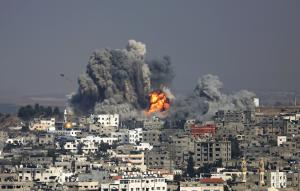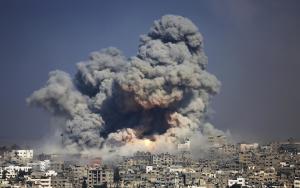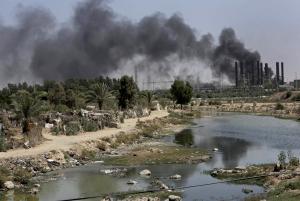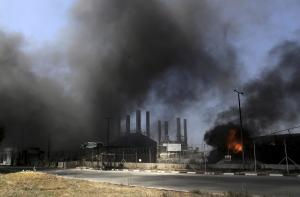GAZA CITY, Gaza Strip (AP) — Israel unleashed its heaviest air and artillery assault of the Gaza war on Tuesday, destroying key symbols of Hamas control, shutting down the territory's only power plant and leaving at least 128 Palestinians dead on the bloodiest day of the 22-day conflict.
Despite devastating blows that left the packed territory's 1.7 million people cut off from power and water and sent the overall death toll soaring past 1,200, Hamas' shadowy military leader remained defiant as he insisted that the Islamic militants would not cease fire until its demands are met.
The comments by Mohammed Deif in an audiotape broadcast on a Hamas satellite TV channel cast new doubt on international cease-fire efforts. Aides to Palestinian President Mahmoud Abbas said Egypt was trying to bring Israeli and Palestinian delegations together in Cairo for new talks in which Hamas would be presented this time as part of the Palestinian team.
Israel's final objective in Gaza remained unclear a day after Prime Minister Benjamin Netanyahu warned Israelis to be prepared for a "prolonged" war.
Netanyahu is under pressure from hawkish members of his coalition to topple Hamas in an all-out offensive, but has not let on whether he plans to go beyond destroying Hamas rocket launchers, weapons depots and military tunnels used to infiltrate Israel and smuggle weapons.
Dozens of Israeli airstrikes and heavy tank shelling hit areas across Gaza, which was plunged into complete darkness Tuesday night after a strike on its sole power plant set a fuel tank ablaze.
In the sprawling Jebaliya refugee camp in northern Gaza, at least 24 people — 10 of them from the same family — were killed and dozens wounded in a barrage of tank fire, Hamas health officials said.
"Tanks were firing in all directions and shrapnel was flying," said Moussa al-Mabhouh, a volunteer for Gaza's Civil Defense. "Smoke was rising from houses and from nearby workshops."
In one incident, shrapnel from a strike in Jebaliya hit near a car with U.N. markings, killing an employee of a U.N. aid agency and his brother, and wounding the man's 12-year-old son, said agency spokesman Adnan Abu Hasna.
The Israeli military has said it is targeting Hamas command centers, along with rocket launchers and weapons arsenals, but has not provided explanations when asked about specific strikes in which many members of a single family were killed.
On Tuesday, multiple members of at least five families were pulled from the rubble after airstrikes and tank shells struck their homes, including the mayor of the Bureij refugee camp, his 70-year-old father and three relatives, according to Palestinian health officials.
View gallery

Smoke and fire from the explosion of an Israeli strike rises over Gaza City, Tuesday, July 29, 2014. …
In all, at least 1,229 Palestinians have been killed, including 128 on Tuesday, making it the single deadliest day since the start of fighting on July 8, said Palestinian health official Ashraf al-Kidra. More than 7,000 have been wounded, he said.
Israel says it has lost 53 soldiers, along with two Israeli civilians and a Thai national.
Despite the heavy Palestinian losses, Deif, the commander of the Hamas military wing, said fighting would continue. "There is not going to be a cease-fire as long as the demands of our people are not fulfilled," he said.
Hamas has demanded that Israel and Egypt lift a border blockade they imposed on Gaza after Hamas seized the territory in 2007. Over the past year, Egypt has further tightened restrictions, shutting down hundreds of smuggling tunnels under the Egypt-Gaza border that had provide crucial tax income to Hamas. The closure of the tunnels drove Hamas into a severe financial crisis.
Deif's voice was recognizable in the audio statement on Al-Aqsa TV. He has survived repeated Israeli assassination attempts and has operated from hiding for years.
View gallery

Smoke and fire from the explosion of an Israeli strike rise over Gaza City, Tuesday, July 29, 2014. …
Al-Aqsa also broadcast a videotape it said showed an infiltration by Hamas fighters into Israel on Monday through a border tunnel. The footage showed armed Palestinians climbing out of a hole in the ground and attacking an Israeli guard post near the border. They were then seen fleeing back down the hole.
The Israeli military said Hamas infiltrated Israeli territory near a communal farm and killed five soldiers on guard nearby. A Hamas gunman was also killed in the attack. Israeli media reported a soldier shot and killed him while he was dragging one of the bodies back to the tunnel.
The military said Palestinian militants fired at least 64 rockets Tuesday at Israeli cities.
Israel has said its troops will not leave Gaza until they have demolished the sophisticated network of Hamas attack tunnels under the Gaza-Israel border and inflicted major damage on the group's arsenal and rocket launchers.
Meanwhile, the miserable living condition of Gaza's 1.7 million people deteriorated even further after two Israeli tank shells struck one of three fuel tanks of Gaza's only power plant. The hit set off a massive fire, and a column of thick putrid smoke rose from the site for hours.
View gallery

Smoke rises from the Gaza power plant after it was hit by Israeli strikes, in the Nusseirat refugee …
"We need at least one year to repair the power plant, the turbines, the fuel tanks and the control room," said Fathi Sheik Khalil of the Gaza Energy Authority. "Everything was burned."
The shutdown meant that Gaza has an 80 percent deficit of electricity, said Sari Bashi of the Israeli rights group Gisha. Widespread power outages also disrupt water supplies because electricity is needed to operate water pumps. In Gaza, about 1.2 million have no access to running water, she said.
Maher Salem of the utilities department in the Gaza City municipality said about 600,000 of the city's 800,000 residents were facing water problems.
"But the most catastrophic issue for us, which is the ticking bomb, is that once we have run out of fuel (for back-up generators), we have to shut down the waste water treatment," he said, adding that fuel would last up to four more days.
In Washington, State Department spokeswoman Jen Psaki said the Obama administration urges "all parties to respect the civilian nature of these facilities." The Israeli military has not commented on the shelling of the power plant.
View gallery

Smoke and flames rise from the Gaza power plant after it was hit by Israeli strikes, in the Nusseira …
Earlier Tuesday, Israeli warplanes carried out dozens of attacks, leveling the home of the top Hamas leader in Gaza, Ismail Haniyeh, and damaging the offices of the movement's Al-Aqsa satellite TV station, a central mosque in Gaza City and government offices.
Haniyeh's house, in a narrow alley of the Shati refugee camp, was reduced to rubble but no one was hurt. Residents placed a large framed portrait of Haniyeh atop the wreckage and draped it with green Hamas flags and Palestinian national banners.
Israel has targeted several homes of Hamas leaders but so far none has been killed. Haniyeh said in a statement Tuesday that "destroying stones will not break our determination."
Meanwhile, two aides to Abbas said the Palestinian leader and the top Hamas official in exile, Khaled Mashaal, are trying to put together a joint delegation that would present Palestinian demands in future cease-fire talks in Cairo.
Abbas and Hamas are former bitter rivals, but took a step toward reconciliation earlier this year when Hamas ceded some power to a technocrat government headed by Abbas.
Egypt has expressed willingness to host indirect talks, but has said the two sides must observe a humanitarian truce of unspecified duration before talks can begin, said the two officials who spoke on condition of anonymity because they were not authorized to discuss internal deliberations with the media.
___
Alhlou reported from Jerusalem. Associated Press writers Ian Deitch in Jerusalem and Matthew Lee in Washington contributed to this report.